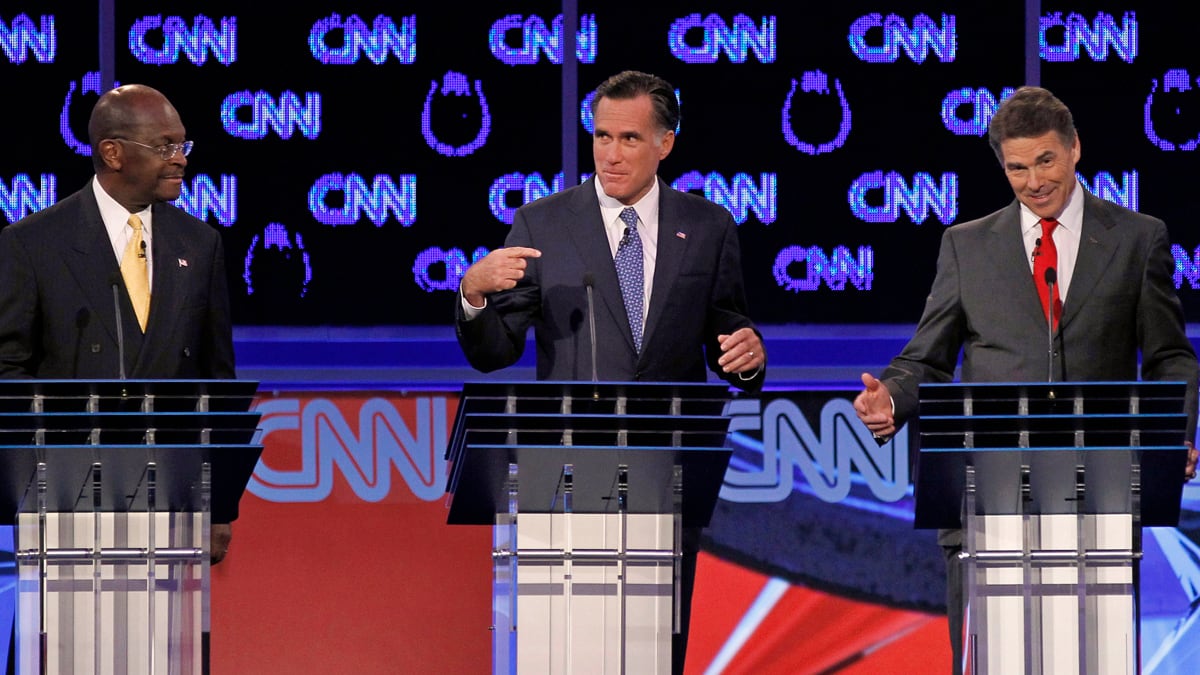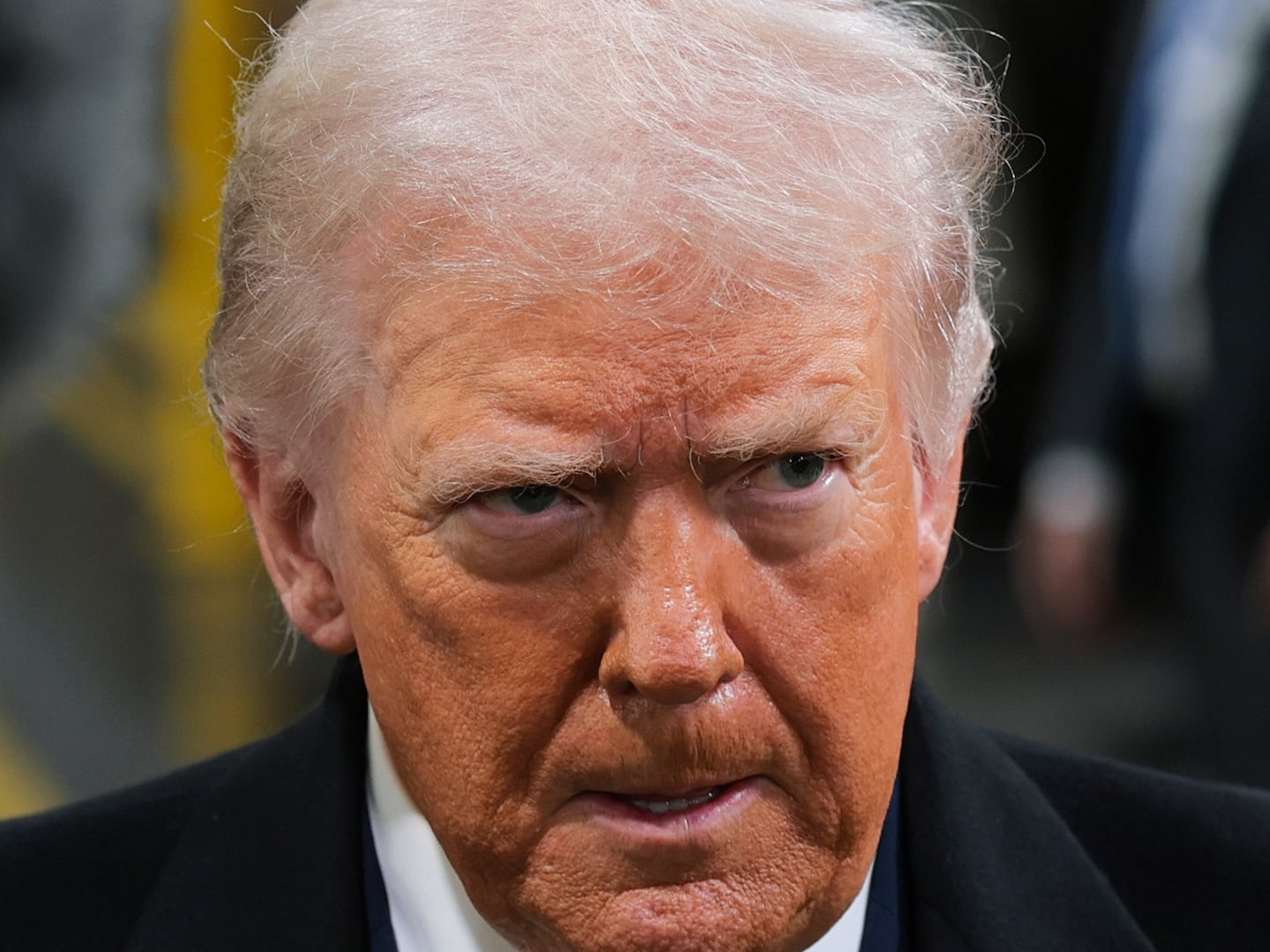After a seemingly endless series of eight prior candidate encounters, one of the GOP presidential contenders finally came up with an ingenious debate strategy that counts as fearless, distinctive, and utterly original: attacking Ronald Reagan over the arms-for-hostages deals during Iran-Contra.
Near the conclusion of a deeply damaging slugfest that weakened every candidate on stage, Congressman Ron (“Dr. Demento”) Paul outrageously trashed the Gipper’s memory in response to pre-debate Herman Cain comments about trading Guantánamo terrorists for a hypothetically kidnapped American soldier. Newt Gingrich shouldered his way into the discussion and seized the opportunity to defend Reagan’s legacy (and to plug a documentary the former speaker coproduced with his wife, Callista) by reminding the audience that the most popular Republican of the last 50 years actually regretted sending weapons to Iran in return for American captives.
When a big CNN debate that’s supposed to focus on America’s future concludes with an utterly irrelevant dispute about a 25-year-old scandal that tarnished the reputation of a conservative saint, then you know it was a terrible night for the party. One of the savviest political observers I know (who’s been working for Republicans since the Nixon era) sent a terse text message offering an appropriate reaction to the Destruction Derby: “GOP, RIP.”

As the well-funded frontrunner, Mitt Romney had the most to lose in the Las Vegas debate, and he probably did lose the most in the ugly, Hobbesian war of all-against-all that unfolded under the wry prodding of moderator Anderson Cooper. In previous confrontations, Romney glided effortlessly above the fray, listening attentively and sympathetically to even the most inane comments by his competitors, never dropping his suave self-assurance or genial demeanor, cleverly reserving his harshest rhetorical barbs for the ultimate enemy, Barack Obama. On Tuesday night, viewers got their first glimpse of a rattled Romney who seemed unmistakably frustrated by crude and nasty attacks from the two rantin’ Ricks—Santorum and Perry—who slimed the governor over Romneycare and immigration (respectively). The irritation made sense given the fact that his interlocutors wouldn’t shut up and gave Mitt no chance to respond to their angry charges. But whenever a candidate pleads for the right to finish a statement without interruption, and even appeals to a moderator to enforce order, he looks weak and unworthy as a prospective commander in chief.
Mitt also demeaned himself with his needling, insistent attacks on Perry’s immigration record and his condescending comments about his Texan foe. It’s true that Perry had a tough time in prior debates, but Mitt looked snide and smug when he brought up those previous performances, or school-marmishly reminded the governor that if he wanted to be president he needed to allow others the chance to talk.
Romney remains by far the most formidable debater in the group in terms of substance, and the transcript of his performance will read better in writing than the visual and audio impressions conveyed on air. He also enjoyed a few genuinely presidential moments, including his impassioned insistence that attacks centering on a candidate’s personal faith ought to be out of bounds, and his gracious acceptance of Perry’s feeble, inadequate (and repeated) acknowledgment that he “disagreed” with comments by one of his pastoral advocates about the evils of Mormonism.
Perry began the debate with more energy, focus, and confidence than he brought to the table in previous engagements, but, as always, he looked increasingly exhausted and confused as the evening wore on. His oafish effort to smear Romney for once contracting with a lawn service that employed illegals (a cheap-shot charge exhaustively explored in Mitt’s previous campaign four years ago) marked a new low point for the Perry campaign and leads me to the conclusion that unslick Rick will feel forced to terminate his collapsing candidacy at some point before the Iowa caucuses.
Herman Cain probably suffered the least of all candidates, remaining unflappable, avuncular, and incurably engaging even as his rivals effectively shredded his now largely discredited 9-9-9 tax plan. Not even an earthy communicator like the Herminator can plausibly insist that a tax restructuring could simultaneously maintain revenues at their current rate and lower burdens on corporations and the rich, without raising payments for the middle class and the poor. As a math major in college and holder of a graduate degree in computer science, Cain surely understands that it doesn’t work to take in the same amount of money and to reduce taxes on some citizens, unless you’re simultaneously hiking taxes on others.
At least Michele Bachmann acknowledged this point when she agreed that expanding the tax base (an obvious requirement for any effective reform) means demanding some contribution from every citizen, but this proposition won’t help her popularity with the 43 percent of the public who currently pay nothing to the IRS (and often receive money as tax credits).
All in all, only Democrats (and Jon Huntsman, who boycotted the proceedings over primary-scheduling disputes) could have enjoyed this evening of mean-spirited sniping over mostly irrelevant issues. GOP contenders and their managers can at least try to reassure themselves by solemnly repeating Sin City’s tourism mantra (cleverly invoked by Rep. Bachmann in her opening statement): what happens in Vegas, stays in Vegas.
They should be so lucky.






